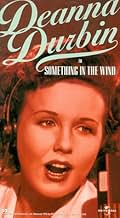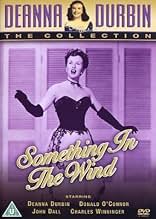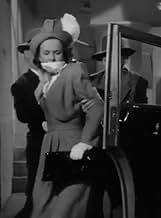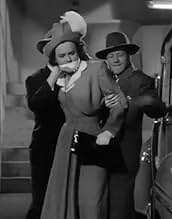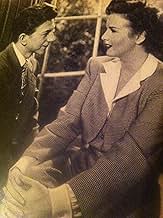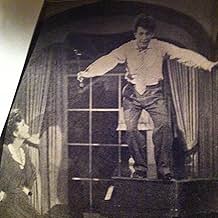IMDb RATING
6.5/10
557
YOUR RATING
A grandson of a recently deceased millionaire mistakes a beautiful female disc jockey for her aunt, who once dated the grandfather.A grandson of a recently deceased millionaire mistakes a beautiful female disc jockey for her aunt, who once dated the grandfather.A grandson of a recently deceased millionaire mistakes a beautiful female disc jockey for her aunt, who once dated the grandfather.
The Williams Brothers
- Singing Quartet
- (as The Four Williams Brothers)
Jacqueline deWit
- Fashion Show Saleslady
- (as Jacqueline de Wit)
Patricia Alphin
- Fashion Show Model
- (uncredited)
Polly Bailey
- Old Woman
- (uncredited)
William Bailey
- Mr. Belton's Assistant
- (uncredited)
Audrey Betz
- Women's Quartette Member
- (uncredited)
Stanley Blystone
- TV Station Guard
- (uncredited)
Betty Blythe
- Society Matron
- (uncredited)
June Bright
- Fashion Show Model
- (uncredited)
Ralph Brooks
- Radio Station Prompter
- (uncredited)
Featured reviews
SOMETHING IN THE WIND (Universal-International, 1947), directed by Irving Pichel, is not a disaster hurricane or tornado movie, but a light-hearted musical-comedy starring the once-popular Deanna Durbin in one of her final film roles before closing her chapter in movie making by 1948. Considering a handful of "Wind" movie titles, consisting of THE WIND (1928), WOMEN IN THE WIND (1939), REAP THE WILD WIND (1942), VOICE IN THE WIND (1944), and the most famous wind of all, GONE WITH THE WIND (1939), SOMETHING IN THE WIND is simply a song title tagged to an ordinary story quite common during the screwball genre of the 1930s. Following weak comedy attempts of BECAUSE OF HIM (1946) and I'LL BE YOURS (1947), Durbin's latest installment is actually one of her better efforts, especially with the assistance Donald O'Connor.
Abandoning her shoulder-length hairstyle for a more mature 1940s style appearance, Deanna Durbin plays Mary Collins, a singing disc-jockey for WFOB Radio Station. After finishing her daily program, Mary is approached by the angry and upset Donald Read (John Dall), a rich, stuck-up snob identifying himself as grandson to the late Henry Read. Unaware of his purpose, she finds he wants her to sign a cash settlement to cease any further financial means she's been receiving for many years. Accused of being this old man's mistress, Mary, not liking this young man's tactics, storms out of the station. Once home where she lives with her Aunt Mary (Jean Adair), Mary soon learns it's her aunt, who, many years ago, had worked as governess for the Reads where she met and fell in love with Henry. Because the Read family disapproved of their relationship due to social standings, the engagement was broken, with Henry marrying another. Because of his engagement to socialite, Clarissa Prentice (Helena Carter), and hoping to avoid any scandal connected with the family name, Donald gets Charlie (Donald O'Connor), his third cousin, to go to the radio station and abduct Mary. Once inside the Read estate, Mary, knowing the situation to be mistaken identity, is unable to convince other family members, consisting of Grandma Read (Margaret Wycherly) and Uncle Chester (Charles Winninger) she's not the Mary Collins in question, decides to go on with her masquerade and accept the payoff settlement of a million dollars to support her and Henry's "child." As Mary and Donald plot against each other, one of the family members discovers Mary's deception and plots against her.
With Music and Lyrics by Johnny Green and Leo Robin, the motion picture soundtrack is as follows: "The Turntable Song," "Happy-Go-Lucky and Free" (both sung by Deanna Durbin); "I Love a Mystery" (sung and performed by Donald O'Connor); "Don't You, Daddy?" (sung by Durbin during fashion show); "The Turntable Song" (sung by The Four Williams Brothers and Donald O'Connor); "Something in the Wind," "It's Only Love" (both sung by Durbin); "Miserere" from Guiseppe Verdi's IL TROVADORE (sung and performed by Durbin and Jan Peerce, Star of the Metropolitan Opera Company); "Happy-Go-Lucky and Free" and "Something in the Wind" (reprises). Though the songs are forgettable, they're agreeably pleasant. Aside from Durbin's singing, Donald O'Connor highlights with his "I Love a Mystery" number, a somewhat forerunner to his antics to "Make 'Em Laugh" from "Singin' in the Rain" (MGM, 1952), which displays his ability in bot showmanship and comedy. Opera singer Jan Peerce, in a rare screen appearance, cast as a policeman, provides some fine moments singing opposite Durbin in jail. Other cast members include: Jacqueline De Wit (The Saleslady); William Ching (Master of Ceremonies); Chester Clute, Hal K. Dawson, Frank Wilcox, among others.
A couple interesting aspects about SOMETHING IN THE WIND is a look back at early television production provided towards the film's end, and the casting of dramatic actor, John Dall. Dall, on loan from Warner Brothers, best known for his rare screen work of THE CORN IS GREEN (1945), ROPE (1948) and GUN CRAZY (United Artists, 1949), seems uncomfortable in his role, especially when comedy is concerned. A loan-out from MGM's Peter Lawford might have been sufficient, but Dall does his best to make his character believable.
Scarcely shown on television, especially public television where it was commonly shown in the 1980s, SOMETHING IN THE WIND is pleasant, breezy89 minute entertainment, even without the wind. Distributed to home video in 1998, it's currently available on DVD with Durbin's feature film debut, THREE SMART GIRLS (1936), also featuring Charles Winninger, on its flip side. (***)
Abandoning her shoulder-length hairstyle for a more mature 1940s style appearance, Deanna Durbin plays Mary Collins, a singing disc-jockey for WFOB Radio Station. After finishing her daily program, Mary is approached by the angry and upset Donald Read (John Dall), a rich, stuck-up snob identifying himself as grandson to the late Henry Read. Unaware of his purpose, she finds he wants her to sign a cash settlement to cease any further financial means she's been receiving for many years. Accused of being this old man's mistress, Mary, not liking this young man's tactics, storms out of the station. Once home where she lives with her Aunt Mary (Jean Adair), Mary soon learns it's her aunt, who, many years ago, had worked as governess for the Reads where she met and fell in love with Henry. Because the Read family disapproved of their relationship due to social standings, the engagement was broken, with Henry marrying another. Because of his engagement to socialite, Clarissa Prentice (Helena Carter), and hoping to avoid any scandal connected with the family name, Donald gets Charlie (Donald O'Connor), his third cousin, to go to the radio station and abduct Mary. Once inside the Read estate, Mary, knowing the situation to be mistaken identity, is unable to convince other family members, consisting of Grandma Read (Margaret Wycherly) and Uncle Chester (Charles Winninger) she's not the Mary Collins in question, decides to go on with her masquerade and accept the payoff settlement of a million dollars to support her and Henry's "child." As Mary and Donald plot against each other, one of the family members discovers Mary's deception and plots against her.
With Music and Lyrics by Johnny Green and Leo Robin, the motion picture soundtrack is as follows: "The Turntable Song," "Happy-Go-Lucky and Free" (both sung by Deanna Durbin); "I Love a Mystery" (sung and performed by Donald O'Connor); "Don't You, Daddy?" (sung by Durbin during fashion show); "The Turntable Song" (sung by The Four Williams Brothers and Donald O'Connor); "Something in the Wind," "It's Only Love" (both sung by Durbin); "Miserere" from Guiseppe Verdi's IL TROVADORE (sung and performed by Durbin and Jan Peerce, Star of the Metropolitan Opera Company); "Happy-Go-Lucky and Free" and "Something in the Wind" (reprises). Though the songs are forgettable, they're agreeably pleasant. Aside from Durbin's singing, Donald O'Connor highlights with his "I Love a Mystery" number, a somewhat forerunner to his antics to "Make 'Em Laugh" from "Singin' in the Rain" (MGM, 1952), which displays his ability in bot showmanship and comedy. Opera singer Jan Peerce, in a rare screen appearance, cast as a policeman, provides some fine moments singing opposite Durbin in jail. Other cast members include: Jacqueline De Wit (The Saleslady); William Ching (Master of Ceremonies); Chester Clute, Hal K. Dawson, Frank Wilcox, among others.
A couple interesting aspects about SOMETHING IN THE WIND is a look back at early television production provided towards the film's end, and the casting of dramatic actor, John Dall. Dall, on loan from Warner Brothers, best known for his rare screen work of THE CORN IS GREEN (1945), ROPE (1948) and GUN CRAZY (United Artists, 1949), seems uncomfortable in his role, especially when comedy is concerned. A loan-out from MGM's Peter Lawford might have been sufficient, but Dall does his best to make his character believable.
Scarcely shown on television, especially public television where it was commonly shown in the 1980s, SOMETHING IN THE WIND is pleasant, breezy89 minute entertainment, even without the wind. Distributed to home video in 1998, it's currently available on DVD with Durbin's feature film debut, THREE SMART GIRLS (1936), also featuring Charles Winninger, on its flip side. (***)
Deanna Durbin was a HUGE star in the 1930s-40s--and for a while she was the highest paid actress in Hollywood. However, today most folks probably haven't heard of her. This is because Miss Durbin walked away from her film career when she was in her 20s and going strong-- apparently because she got bored with films and the very formulaic films they put her in over the years. This sort of problem is pretty obvious in "Something in the Wind"--a film where Durbin did quite well but the writing of the film was clearly well below her. Little did Universal Studios realize that in giving her crap scripts like this, they were also pushing their big money-maker out the studio door!
The film begins with Mary Collins (Durbin) leaving work at the radio station when an obnoxious and ill-informed lawyer accosts her and tries to get her to sign some release. She has no idea WHAT he's talking about and finds his comments insulting. However, when she gets home, she learns from the aunt that the lawyer mistook Mary for the aunt--who is also named Mary! It seems that long ago, Aunt Mary was involved with some rich guy but he dumped her and married another woman to please his snobby family. Apparently out of feelings of guilt, the old man had been sending Aunt Mary checks...and the man's family ASSUMED that the money was hush money!
Here is where it starts to get a tad dumb. Because Mary wouldn't talk with the lawyer, the family has her kidnapped and they once again ask young Mary to take some sort of settlement to shut up and go away forever in order to 'preserve the family name'. Out of anger, she lies- -telling them that she had the old man's baby!! Now, she insists they give her a million bucks! She has no intention to take the money--she just wants to make the jerks sweat.
Contrived? Yup! But it gets much worse--as the handsome son inexplicably and very, very, very quickly falls in love with Mary (Durbin--not the old lady!). In addition, there is tons of music and dancing--so much so that it really looks like padding since the plot is so thin. So why does it still manage to get a 5? Well, Durbin, when not singing, is very funny and proves she was simply too good for this tripe.
The film begins with Mary Collins (Durbin) leaving work at the radio station when an obnoxious and ill-informed lawyer accosts her and tries to get her to sign some release. She has no idea WHAT he's talking about and finds his comments insulting. However, when she gets home, she learns from the aunt that the lawyer mistook Mary for the aunt--who is also named Mary! It seems that long ago, Aunt Mary was involved with some rich guy but he dumped her and married another woman to please his snobby family. Apparently out of feelings of guilt, the old man had been sending Aunt Mary checks...and the man's family ASSUMED that the money was hush money!
Here is where it starts to get a tad dumb. Because Mary wouldn't talk with the lawyer, the family has her kidnapped and they once again ask young Mary to take some sort of settlement to shut up and go away forever in order to 'preserve the family name'. Out of anger, she lies- -telling them that she had the old man's baby!! Now, she insists they give her a million bucks! She has no intention to take the money--she just wants to make the jerks sweat.
Contrived? Yup! But it gets much worse--as the handsome son inexplicably and very, very, very quickly falls in love with Mary (Durbin--not the old lady!). In addition, there is tons of music and dancing--so much so that it really looks like padding since the plot is so thin. So why does it still manage to get a 5? Well, Durbin, when not singing, is very funny and proves she was simply too good for this tripe.
Deanna Durbin was at the peak of her vocal abilities on screen by the time she made SOMETHING IN THE WIND and fortunately she has some pleasant and frequent musical interludes sprinkled throughout what is essentially a feeble plot.
She's once again up to her neck in a plot relying heavily on mistaken identity and pretending to be someone she's not. Her leading men are Donald O'Connor and John Dall, the latter being her love interest in a somewhat wooden performance. O'Connor tends to over exert himself in some rambunctious musical numbers while Deanna not only sings some lively numbers but also joins Jan Peerce, tenor of the Metropolitan Opera, for an operatic aria.
Obviously the film was designed to give Deanna a new and more glamorous look and wardrobe and some popular melodies to sing rather than the usual operatic or semi-classical numbers. Unfortunately, the plot is no more adult than her "little Miss Fix-it" fluff earlier in her career. But she looks wonderful and is in extremely good voice for all of her vocals. A pleasant and diverting experience for true Deanna Durbin fans.
She's once again up to her neck in a plot relying heavily on mistaken identity and pretending to be someone she's not. Her leading men are Donald O'Connor and John Dall, the latter being her love interest in a somewhat wooden performance. O'Connor tends to over exert himself in some rambunctious musical numbers while Deanna not only sings some lively numbers but also joins Jan Peerce, tenor of the Metropolitan Opera, for an operatic aria.
Obviously the film was designed to give Deanna a new and more glamorous look and wardrobe and some popular melodies to sing rather than the usual operatic or semi-classical numbers. Unfortunately, the plot is no more adult than her "little Miss Fix-it" fluff earlier in her career. But she looks wonderful and is in extremely good voice for all of her vocals. A pleasant and diverting experience for true Deanna Durbin fans.
Those who know DD from her "little Miss fixit" movies of the 1930s will be very surprised by this film. She is now an adult, styled very much to look like an even more attractive Gale Storm, and she turns out to be both a very fine actress in romantic comedy and, low and behold, one very sexy singer. Her performance of "Thank you Daddy" is right up there with Rita Hayworth's classic Gilda performance. Frankly, she is far more interesting in this movie, at least to an adult male, than she was in those cute 1930s movies.
Donald O'Conner is also VERY good in this movie. "I love a mystery" is, indeed, a harbinger of what he will do, that much better, in Singing in the Rain. It's not at that level, but it's very good.
The character actors and actresses all deliver fine performances.
And Jan Peerce as the jail keep is not to be missed. I grew up on his recordings, when he and Tucker were the two great American tenors. Believe me folks, he was indeed great, the equal of any of his European contemporaries. He does the "Miserere" with DD here, and it's good. Interestingly, she does not take the alternate high note in the last repeat, as was customary in those days and as Kitty Carlile (sp?) does in A Night at the Opera (and Rosa Ponselle does in her recording with Caruso). It's great to have a chance to see Peerce again "live."
The weak elements here are the male romantic lead, as noted by other reviewers, who is a dud, and the music. If this had had a score as memorable as some of Judy Garland's movies of the same era, it would be as memorable as those. DD does a remarkable job with what she's given, but in terms of music, she isn't given much.
I like the teenage DD movies. They're fun. But this shows that DD was better as an adult than as a child star, and that's staying a lot.
------------------------------
I watched this again tonight, and really enjoyed it. Durbin really is more interesting as an adult than as a child star. And she really does a bang-up job of "Thank you Daddy." On second viewing, it's less Rita Hayworth in Gilda than Mary Martin in one of her "My Heart Belongs to Daddy" numbers.
The things that keep this from being a great movie have been pointed out by others: the script is weak, the music, though it several times comes close to being memorable, never really is; and the leading man has no chemistry at all. Durbin does a great job with mediocre material, as does O'Connor, but that won't make a silk purse out of a piglet's ear.
Donald O'Conner is also VERY good in this movie. "I love a mystery" is, indeed, a harbinger of what he will do, that much better, in Singing in the Rain. It's not at that level, but it's very good.
The character actors and actresses all deliver fine performances.
And Jan Peerce as the jail keep is not to be missed. I grew up on his recordings, when he and Tucker were the two great American tenors. Believe me folks, he was indeed great, the equal of any of his European contemporaries. He does the "Miserere" with DD here, and it's good. Interestingly, she does not take the alternate high note in the last repeat, as was customary in those days and as Kitty Carlile (sp?) does in A Night at the Opera (and Rosa Ponselle does in her recording with Caruso). It's great to have a chance to see Peerce again "live."
The weak elements here are the male romantic lead, as noted by other reviewers, who is a dud, and the music. If this had had a score as memorable as some of Judy Garland's movies of the same era, it would be as memorable as those. DD does a remarkable job with what she's given, but in terms of music, she isn't given much.
I like the teenage DD movies. They're fun. But this shows that DD was better as an adult than as a child star, and that's staying a lot.
------------------------------
I watched this again tonight, and really enjoyed it. Durbin really is more interesting as an adult than as a child star. And she really does a bang-up job of "Thank you Daddy." On second viewing, it's less Rita Hayworth in Gilda than Mary Martin in one of her "My Heart Belongs to Daddy" numbers.
The things that keep this from being a great movie have been pointed out by others: the script is weak, the music, though it several times comes close to being memorable, never really is; and the leading man has no chemistry at all. Durbin does a great job with mediocre material, as does O'Connor, but that won't make a silk purse out of a piglet's ear.
When Mary Collins strides out utterly confident on stage to sing, I had a momentary flashback to Ethel Merman in 1959 striding down the theater aisle and calling, "Sing out, Louise, sing out!" Mary Collins, I mean Deanna Durbin at 26, was a supremely confident actress and singer, and there are a few times when you wouldn't want to get in her way. Balancing that are things Merman didn't have...a warm personality, a lovely face, a smile that could win you over and a voice that wouldn't break your eardrums. Merman was an amazing, one-of-a-kind performer; so was Deanna Durbin. What they share is a perfect confidence in their talent.
With Something in the Wind, audiences were watching a romantic comedy with songs featuring a mature young woman they'd been in love with since she was 15. Alone among the child stars of the Thirties, Deanna Durbin grew up on screen while maintaining her stardom, her poise and her box office clout. Here, as Mary Collins, she's a disc jockey who discovers that her aunt who raised her, also named Mary Collins, had been receiving regular checks from a wealthy industrialist. They had once been in love but the marriage plans had been broken up by his family. The whole thing was platonic, but when the old man died his will stated that the financial arrangements must continue. But now the young scion of the family, Donald Read (John Dall), wants to stop the arrangement and pay Mary Collins off. He wants no scandal. He thinks our Mary has been his grandfather's friend. He doesn't realize our Mary has an aunt with the same name. Mary doesn't know what he's talking about but is furious at the implication. Donald is a prig and engaged to a well-bred socialite. His grandmother is a woman who believes breeding is all. His younger brother, Charlie (Donald O'Connor), is much more unconventional. After our Mary is kidnapped and at first kept at the Read family mansion until she agrees to the arrangement, we are in for over an hour of romantic mix- ups, complicated machinations, a perfect lawyer (blind and deaf), six songs by Durbin, three songs and comedy routines by O'Connor, and then true love finding a way. What does the movie add up to? For firm Deanna Durbin fans, a delight. For those who simply like her a lot, a mixed bag.
On the plus side are Durbin and O'Connor. One almost wishes they'd been the happy couple at the end. Durbin sings everything from a bit of Verdi to a down-and-dirty "You want to keep your baby lookin' right, doncha, Daddy?" Her personality shines through. She's funny and sincere. O'Connor is O'Connor and he's great. He has one number, "I Love a Mystery," which is almost a rehearsal for his "Make 'Em Laugh" routine in Singin' in the Rain. The songs, by Johnny Green and Leo Robin, are just fine, with two better than just fine numbers, "The Turntable Song" and "Something in the Wind." And one unexpected and stylishly handled bit features a cameo by Jan Peerce, the great American tenor who had a long career at the Met, as a singing jailer. Durbin is in the jail. It's not long before before they're sharing a duet from Il Trovatore and arguing about who stepped on whose obbligato.
But the movie begins to get tedious when the Mary Collins mix-up is finally discovered, love between Mary and Donald emerges and serious complications concerning proper family breeding sets in. Most problematic is John Dall as Donald Read, the stuffy hero who learns to love. Dall always seemed to me to be not only a limited actor but a man who, just as Lawrence Harvey always seemed genuinely unlikeable, always seemed genuinely artificial. He was unnerving as the artificially sincere killer-for-thrills in Rope a year later, but here he creates a big hole in the movie. He simply isn't interesting enough or strong enough to compete in the comedy or romance departments with Durbin.
With Something in the Wind, audiences were watching a romantic comedy with songs featuring a mature young woman they'd been in love with since she was 15. Alone among the child stars of the Thirties, Deanna Durbin grew up on screen while maintaining her stardom, her poise and her box office clout. Here, as Mary Collins, she's a disc jockey who discovers that her aunt who raised her, also named Mary Collins, had been receiving regular checks from a wealthy industrialist. They had once been in love but the marriage plans had been broken up by his family. The whole thing was platonic, but when the old man died his will stated that the financial arrangements must continue. But now the young scion of the family, Donald Read (John Dall), wants to stop the arrangement and pay Mary Collins off. He wants no scandal. He thinks our Mary has been his grandfather's friend. He doesn't realize our Mary has an aunt with the same name. Mary doesn't know what he's talking about but is furious at the implication. Donald is a prig and engaged to a well-bred socialite. His grandmother is a woman who believes breeding is all. His younger brother, Charlie (Donald O'Connor), is much more unconventional. After our Mary is kidnapped and at first kept at the Read family mansion until she agrees to the arrangement, we are in for over an hour of romantic mix- ups, complicated machinations, a perfect lawyer (blind and deaf), six songs by Durbin, three songs and comedy routines by O'Connor, and then true love finding a way. What does the movie add up to? For firm Deanna Durbin fans, a delight. For those who simply like her a lot, a mixed bag.
On the plus side are Durbin and O'Connor. One almost wishes they'd been the happy couple at the end. Durbin sings everything from a bit of Verdi to a down-and-dirty "You want to keep your baby lookin' right, doncha, Daddy?" Her personality shines through. She's funny and sincere. O'Connor is O'Connor and he's great. He has one number, "I Love a Mystery," which is almost a rehearsal for his "Make 'Em Laugh" routine in Singin' in the Rain. The songs, by Johnny Green and Leo Robin, are just fine, with two better than just fine numbers, "The Turntable Song" and "Something in the Wind." And one unexpected and stylishly handled bit features a cameo by Jan Peerce, the great American tenor who had a long career at the Met, as a singing jailer. Durbin is in the jail. It's not long before before they're sharing a duet from Il Trovatore and arguing about who stepped on whose obbligato.
But the movie begins to get tedious when the Mary Collins mix-up is finally discovered, love between Mary and Donald emerges and serious complications concerning proper family breeding sets in. Most problematic is John Dall as Donald Read, the stuffy hero who learns to love. Dall always seemed to me to be not only a limited actor but a man who, just as Lawrence Harvey always seemed genuinely unlikeable, always seemed genuinely artificial. He was unnerving as the artificially sincere killer-for-thrills in Rope a year later, but here he creates a big hole in the movie. He simply isn't interesting enough or strong enough to compete in the comedy or romance departments with Durbin.
Did you know
- TriviaDonald O'Connor's first movie after returning from service in World War II.
- Quotes
Orchestra Leader at Fashion Show: And now for our new collection of evening gowns. These gowns are designed to ensure that large amounts of money change hands. The fainthearted are advised not to look.
- How long is Something in the Wind?Powered by Alexa
Details
- Release date
- Country of origin
- Language
- Also known as
- Something in the Wind
- Filming locations
- Production company
- See more company credits at IMDbPro
- Runtime
- 1h 34m(94 min)
- Color
- Aspect ratio
- 1.37 : 1
Contribute to this page
Suggest an edit or add missing content

